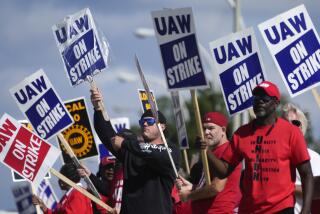GM, Chrysler federal bailouts were net economic gain, report argues
- Share via
As the federal government gets ready to sell the last of its shares in General Motors Co., a research institute has calculated the final bill on the auto industry bailout and says that taxpayers were net winners.
The Center for Automotive Research, a Michigan nonprofit organization that analyzes auto industry issues, said Monday that the U.S. government will lose about $13.7 billion on its bailout of GM and Chrysler Group.
But the think tank said those funds “saved or avoided the loss of $105.3 billion in transfer payments and the loss of personal and social insurance tax collections -- or 768% of the net investment.”
PHOTOS: Ford debuts 2015 Mustang
Additionally, the center said the bailouts and financial restructurings saved about 2.6 million jobs in the U.S. economy in 2009 and $284.4 billion in personal income over 2009 and 2010.
In the report, “The Effect on the U.S. Economy of the Successful Restructuring of General Motors,” researchers Sean McAlinden and Debra Maranger Menk wrote that the value of the bailouts can’t be considered just by what the taxpayers will lose in the sale of GM’s stock.
“Any complete cost-benefit assessment of the federal assistance to GM in its restructuring must consider the total net returns to the public investment in GM in the U.S. economy,” they said. “In other words, the U.S. government is not a simple investor in companies but an active participant, when needed, in the overall U.S. economy on the behalf of all of the U.S. citizenry.”
As the auto industry went into crisis in 2008, the federal government stepped in, lending billions of dollars to GM and Chrysler to keep them afloat. The federal help allowed both companies to restructure their businesses through bankruptcies. Today, both companies are profitable.
A shutdown of the two automakers would have spilled into the rest of the auto industry because of the structure of the auto parts supplier base in the U.S., and caused catastrophic economic damage, the report said.
“The failure of one or more key suppliers -- no matter how large or small -- can shut down entire supply chains, resulting in multiple vehicle and truck assembly plant closings and resonating throughout the entire vehicle aftermarket,” the researchers wrote.
This would have been most severe in 2009 and gradually eased over the next two years, they wrote.
“Much of U.S. auto manufacturing employment would have recovered without U.S. government intervention by 2011 or sometime thereafter, but there would have been a decided shift in the location of this employment to the southern portion of the United States,” they said.
The industrial Midwest, including Michigan, Ohio, and Indiana, would have suffered the most from the relocation of the industry, according to the report.
“Double-digit unemployment rates would still exist in these states today,” the researchers said.
Other analysts said it was hard to judge the net effect of the bailouts.
“If you only count the things that make you look good and don’t count the things that make you look bad, any investment will look good and any investment will be profitable,” said Dan Mitchell, senior fellow at the libertarian-leaning Cato Institute.
He said the analysis doesn’t place a value on the adjustments that the auto industry would have been forced to make in the absence of a bailout.
“Those adjustments, more meaningful concessions in labor costs and work rules, would have put the auto industry on a sounder footing,” he said.
ALSO:
Editor’s Picks from the L.A. Auto Show
Top five concept cars you should care about
Follow me on Twitter (@LATimesJerry), Facebook and Google+.







